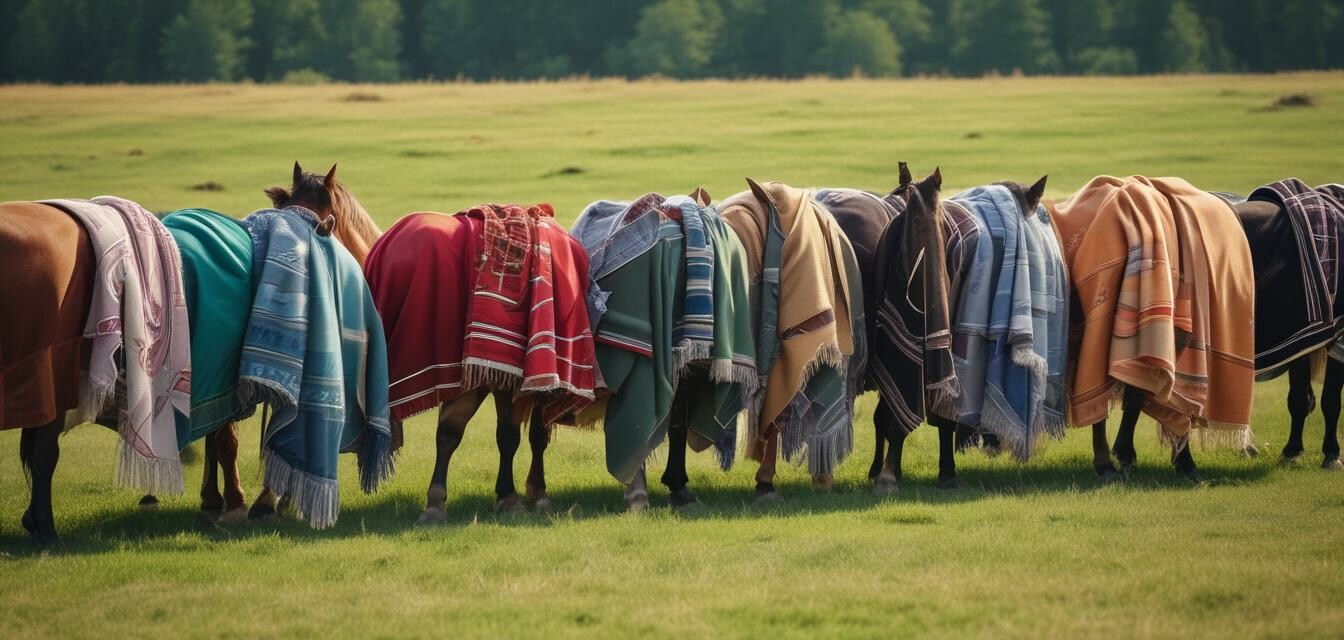
Comparing Horse Blankets: Which One is Right for You?
Key Takeaways
- Understanding the different types of horse blankets is essential for optimal comfort.
- Consider factors such as size, material, and insulation when choosing a blanket.
- There are specific blankets for various weather conditions and activities.
- Compare features to find the best fit for your horse's needs.
Choosing the correct horse blanket can be a daunting task. With various types available on the market, understanding the specific features of each option is essential for your horse's comfort and protection. In this comprehensive guide, we will break down the different types of horse blankets available, their purposes, and what to consider when making your choice.
Types of Horse Blankets
Horse blankets come in several categories, each designed for specific needs. Here’s a table detailing the most common types:
| Type of Blanket | Description | Best For |
|---|---|---|
| Turnout Blankets | Waterproof and durable blankets made for outdoor use. | Wet and cold weather conditions. |
| Stable Blankets | Insulated blankets ideal for keeping horses warm in stalls. | Cold indoor conditions. |
| Sheet Blankets | Lightweight and breathable, often used in milder climates. | General warmth without overheating. |
| Cooler Blankets | Designed to wick moisture away from the horse post-exercise. | Drying and cooling off after workouts. |
| Fly Sheets | Lightweight and designed to protect against insects. | Warm weather when flies are prevalent. |
Factors to Consider When Choosing Horse Blankets
When selecting a horse blanket, several factors should be taken into account to ensure you make the right choice:
1. Size
Every horse is different, and a correctly sized blanket is crucial for comfort. Measure your horse from the center of the chest to the point of the buttocks and refer to size charts provided by manufacturers. A proper fit ensures that the blanket stays in place without causing chafing.
2. Material
The material of the blanket affects both warmth and breathability. Here are common materials:
- Denier: A measure of the thickness of the fabric; higher denier numbers indicate sturdier materials.
- Waterproofing: Some blankets feature waterproof coatings or membranes to keep your horse dry.
- Breathability: Important for perspiration management—look for materials that allow moisture to escape.
3. Fill Weight
The fill weight denotes the level of insulation within the blanket. Know the average temperatures your horse will be exposed to and select a fill weight that offers adequate warmth for those conditions.
4. Features
Different blankets come with various features, including:
- Leg Arches: Allow for freedom of movement while keeping the blanket in place.
- High Necklines: Provide extra coverage for the neck and prevent cold drafts.
- Cross Surcingles: Help the blanket stay secure and prevent shifting.
Comparative Summary
To help further, we’ve made a comparison table outlining key differences and similarities among types of horse blankets:
| Type | Waterproof | Insulated | Best Use |
|---|---|---|---|
| Turnout Blanket | Yes | Varies | Outdoor use in rain/snow |
| Stable Blanket | No | Yes | Indoor warmth |
| Sheet Blanket | No | No | Spring/fall days |
| Cooler Blanket | No | No | Post-exercise cooling |
| Fly Sheet | No | No | Insect protection |
Conclusion
Selecting the right horse blanket is essential for the well-being of your horse. Each type of blanket serves a different purpose, so understanding your horse's needs and the environmental factors you face will assist in your choice.
For additional information and guidance on equestrian gear, explore our complete range of Equestrian Gear and Buying Guides available on our site.
Pros of Using Horse Blankets
- Provide warmth during cold weather.
- Protect from harsh environmental conditions.
- Help manage and prevent injury.
- Offer comfort for horses in stalls and during travel.
Cons of Using Horse Blankets
- May cause overheating if not chosen correctly.
- Can shift and cause chafing if improperly fitted.
- Some materials may wear out quickly.
- Insects and dirt can accumulate under blankets.
Additional Resources
To further assist you, check out other relevant articles such as Rider Tips and Advice or Horse Care Products to enhance your knowledge and ensure your horse's comfort and care.
